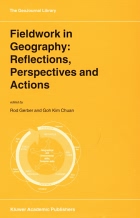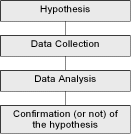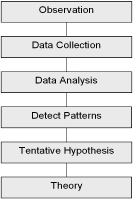Fieldwork Methodology
The two dominant methodologies of fieldwork practice, the traditional and the scientific, have different aims implicit within them. The traditional approaches, sometimes termed 'fieldwork excursions' have aims rooted in the development of content knowledge. The scientific approach of data collection/hypothesis testing and field enquiry extend the learning opportunities available and promote the application of learning objectives to the planning of fieldwork. Using the scientific methodology, learning in the field becomes as rigorous as learning in the classroom from a planning perspective.
These two approaches can be complimentary, with the scientific approach placing a high value on the development of numeracy and analytical thinking skills and the more humanistic fieldwork excursion approach emphasizing and fostering the development of oracy and literacy, and a sense of place.
It can be concluded that fieldwork may be categorised according to its degree of student-centredness. The more traditional, teacher-centred approaches to fieldwork, centre on explanation/lecture, note-taking and directed observation. Under such conditions there is less scope for active student involvement. At best they are required to observe, describe and explain features of the environment using previously acquired knowledge. A more effective, but time-consuming approach is one that incorporates the processes of field research. While still incorporating the elements of observation, description and explanation it adopts a problem-solving focus. Students identify a geographical issue or problem as a result of their observations or studies; they formulate a hypothesis; design a research methodology; collect and record data; process and analyse the information and draw conclusions that result in the acceptance or rejection of the original hypothesis. The type of fieldwork undertaken ultimately depends on the purpose of the activity. Many activities will contain elements of both approaches. The field research approach, where time is available, is our preferred methodology, enhancing the students’ ability to apply inquiry-based skills in different geographical contexts.
We adopt one of three possible approaches to fieldwork, depending upon the curricular requirements of the visiting staff.
A deductive approach, where students generate aims and hypotheses based upon prior theoretical knowledge, select appropriate methods, collect data and carry out analysis.
An inductive or 'enquiry' approach, as generally understood in the context of 16-19 U.K. geography. Issues are introduced, key questions raised, and students select methods to investigate and develop possible solutions to these.
An 'Individual Inquiry' approach, whereby students have the opportunity to select their own topic, adopt their own approach and complete an independent project or field investigation. Staff act as supervisors and advisors, providing equipment, advice and ensuring safe working.
Most commonly, teachers select from our range of field studies that have been designed to meet the requirements of the AS/A2 level U.K. and IB syllabuses. These field studies lend themselves to both deductive and inductive or enquiry approaches.
The deductive method
The deductive method works from the more general to the more specific. For example, we might begin with a theory about expected downstream changes in river channel characteristics. We then narrow that down into more specific hypotheses that we can test. We narrow down even further when we collect data to address the hypotheses. This ultimately leads us to be able to test the hypotheses with specific data - a confirmation (or not) of the original theory.
The deductive field study method The inductive method
Inductive reasoning works the other way round, moving from specific observations to broader generalizations and theories. This approach works well with many issues-based studies, for example, an investigation of the impact of urban renewal schemes in inner-city Barcelona. In inductive reasoning, we begin with the exploration of an area, recording specific observations and data. An analysis of the data enables the identification of patterns and the formulation of some tentative hypotheses that we can explore. The inductive approach ends with the development of some general conclusions or theories.
The inductive field study method
Inductive reasoning, by its very nature, is more open-ended and exploratory. Deductive reasoning is more narrow in nature and tends to be focused explicitly on testing or confirming hypotheses. Many students enjoy a more exploratory approach, yet limited time and examination board requirements often lead teachers to prefer the deductive route. The inductive method can be more intellectually satisfying, lending itself to a wide range of student study topics and where a field study has been piloted, risk assessed and has known outcomes, the approach can also be a very effective use of the time available.
Even though a particular study may look purely deductive, most geographical research involves both inductive and deductive reasoning at some point. Even in the most constrained studies, students may observe patterns in the data that lead them to develop new theories.
The Usefulness of Fieldwork
Improving observation skills and a better understanding of the processes that contributed to the development of environmental features.
Experiential learning: fieldwork provides opportunities to learn through direct, concrete experiences, enhancing the understanding that comes from observing 'real world' manifestations of abstract geographical concepts and processes.
Increasing geographical interest through interacting with the environment.
Directly involving students in responsibility for learning: fieldwork requires that students plan and carry out learning in an independent manner.
Developing and applying analytical skills: fieldwork relies on a range of skills, many of which are not used in the classroom.
Experiencing real-life research: developing investigative, communicative and participatory skills.
Developing environmental ethics and increasing the appreciation of the aesthetic qualities of the biophysical and built environments.
Teamwork: fieldwork experiences provide an important teamwork element, with social benefits derived from working cooperatively with others in a setting outside the classroom.
Skill development: observation, synthesis, evaluation, reasoning, instrumentation skills, practical problem solving, adaptability to new demands that call upon creative solutions, etc.
Uses of technology: applying technology to investigate problems and issues.
U.K. Key Skill development, namely communication, application of number, information technology, working with others, improving own learning performance and problem solving.
Effective Fieldwork
To be effective fieldwork should:
-
be well planned, interesting, cost effective and represent an effective use of the time available
-
target specific syllabus and topic outcomes
-
provide opportunities for students to develop a range of cognitive and manipulative skills
-
be integrated with the subject matter to ensure that students take full advantage of enhanced understanding that is achieved through direct observation, data collection/recording and inquiry learning.
-
be supported by pre-and post-excursion classroom activities that establish the context for learning and provide the necessary follow-up and reinforcement.
Inquiry Centred Learning
This approach has a number of stages, but should not be viewed as a rigid formula. The intent is to enable students to become adept scientific investigators. The steps are as follows:
stating the problem;
formulating the hypotheses;
designing the experiment or fieldwork;
making observations;
interpreting the data;
proposing conclusions.
Bartlett and Cox (1982) applied the scientific inquiry process to field study and developed a schema for field based inquiry. The strength of the schema is that it results in two forms of field based analysis of spatial information. One is the enhanced knowledge and understanding of a particular problem or issue, whilst the other is the enhanced knowledge and explanation of a particular problem or issue leading to theory building or modeling with far greater reaching explanatory powers.
More Information?
Geofile (A level) and GeoActive (GCSE), (pub. Stanley Thornes U.K.) are excellent sources for advice on investigative enquiry techniques, with Stephen Burton's fieldwork techniques series being particularly detailed.
'Fieldwork in Geography' (GeoJournal Library, Pub. Kluwer Academic, 2000), includes a range of methodologies and alternative strategies, with the aim of reaffirming the centrality of fieldwork in geographical and wider education.
It offers fresh ideas for both promoting fieldwork and for maintaining its place in the geography curriculum.


